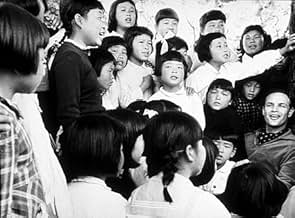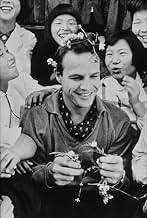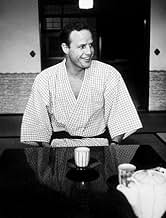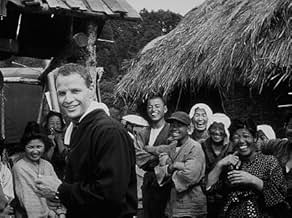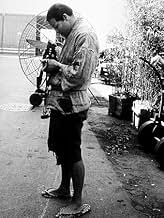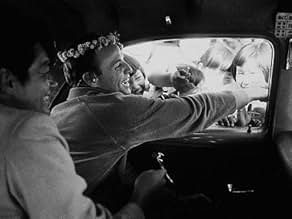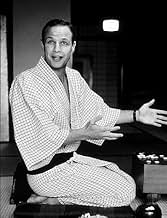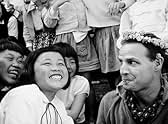IMDb-BEWERTUNG
6,6/10
3962
IHRE BEWERTUNG
Füge eine Handlung in deiner Sprache hinzuIn post-WWII Japan, an American captain is brought in to help build a school, but the locals want a teahouse instead.In post-WWII Japan, an American captain is brought in to help build a school, but the locals want a teahouse instead.In post-WWII Japan, an American captain is brought in to help build a school, but the locals want a teahouse instead.
- Auszeichnungen
- 1 Gewinn & 9 Nominierungen insgesamt
Machiko Kyô
- Lotus Blossom
- (as Machiko Kyo)
Harry Morgan
- Sgt. Gregovich
- (as Henry {Harry} Morgan)
Carlo Fiore
- Soldier
- (Nicht genannt)
John Grayson
- Soldier
- (Nicht genannt)
Harry Harvey Jr.
- Soldier
- (Nicht genannt)
Miyoshi Jingu
- Old Woman on Jeep
- (Nicht genannt)
Roger McGee
- Soldier
- (Nicht genannt)
Dansho Miyazaki
- Sumata's Father
- (Nicht genannt)
Minoru Nishida
- Mr. Sumata
- (Nicht genannt)
Aya Oyama
- Daughter on Jeep
- (Nicht genannt)
Empfohlene Bewertungen
If you're not a fan of Glenn Ford's westerns, and you think he's merely an ordinary everyman, check out his timed perfection in The Teahouse of the August Moon. With such great talent, it's a wonder Jack Lemmon rose to stardom so quickly. Glenn has all the hesitation, stammering, exasperation, and desire to fix that it takes to be a comic genius. If the first time around, you don't catch all his jokes, don't worry. You were just laughing so hard, you couldn't keep up with the fast pace.
Every time I watch this delightful gem, I laugh myself sick. It does have a long running time, but it certainly goes by quickly. Glenn Ford's character is stationed in Okinawa after WWII, to oversee reconstruction and the wellbeing of the Japanese people. But in his mission to spread democracy, he's completely clueless in his new environment. Marlon Brando plays the scene-stealing Sakini, a Japanese interpreter who winks at and nudges the audience when he wants to make an inside joke. But even with an interpreter, Glenn still finds himself getting into one misunderstanding after another.
While it's seen as "white washing" by today's standards, Marlon Brando didn't intend for his performance to be offensive. In fact, he lived in a nearby Japanese village for four months to absorb the mannerisms, accent, and mentality of the local people. I found his portrayal of the savvy interpreter to be flawless; not only that, but I couldn't find any trace of his usual expressions or gestures. He completely transformed himself.
The story is heartwarming, funny, smart, and bittersweet. From Eddie Albert's obsession with soil and worms to Machiko Kyo's touching tea ceremony, this 1956 comedy is a one-of-a-kind gem with countless delightful moments.
Every time I watch this delightful gem, I laugh myself sick. It does have a long running time, but it certainly goes by quickly. Glenn Ford's character is stationed in Okinawa after WWII, to oversee reconstruction and the wellbeing of the Japanese people. But in his mission to spread democracy, he's completely clueless in his new environment. Marlon Brando plays the scene-stealing Sakini, a Japanese interpreter who winks at and nudges the audience when he wants to make an inside joke. But even with an interpreter, Glenn still finds himself getting into one misunderstanding after another.
While it's seen as "white washing" by today's standards, Marlon Brando didn't intend for his performance to be offensive. In fact, he lived in a nearby Japanese village for four months to absorb the mannerisms, accent, and mentality of the local people. I found his portrayal of the savvy interpreter to be flawless; not only that, but I couldn't find any trace of his usual expressions or gestures. He completely transformed himself.
The story is heartwarming, funny, smart, and bittersweet. From Eddie Albert's obsession with soil and worms to Machiko Kyo's touching tea ceremony, this 1956 comedy is a one-of-a-kind gem with countless delightful moments.
Marlon Brando was amazing in this film. I saw the comments made on TCM before they started the film and they said he saw the stage play and begged Paramount (?) to let him have a part in it when they made the film. They said he could have any part he wanted and he picked Sakini, the translator. As a Japanese teacher I want to tell you that I was stunned at his perfect accent! He spoke English exactly as a native Japanese person would. If I hadn't been told ahead of time that it was Marlon Brando, there is no way you could have convinced me that it wasn't a native Japanese actor doing the part. I could see that an attempt was made to make the natives look uneducated and doltish, but having lived in Japan for a year and a half, I simply couldn't see them that way. All you have to do is take a few minutes to watch any people and see the intelligence in their eyes and in their mannerisms and you can see how intelligent they really are whether YOU understand their language or not!
I just had the chance to see this charming movie again in widescreen format in what evidently is a new or restored print on Turner Classic Movies, and I'm realizing that I love the flick more and more each time I see it. The wonderful cast - Glenn Ford, Paul Ford (ironic - no relation!), Eddie Albert, Marlon Brando and Harry Morgan - do a fine job of playing out the movie's humorous meditation on culture clash, and the ability of a strong but flexible people to maintain their Eastern ways in the face of Western "aid". Brando, in particular, is surprising; this is about as far from Stanley Kowalksi or Terry Malloy as you can get, and one would not think him able to do much with a humorous, cross-racial characterization, yet the brilliant and convincing manner in which he pulls it off reminds us of the great thespian talent he once possessed and which he tended to squander as his life progressed. I believe this film had its origins in a very successful stage play; we can thank the forces involved for committing this funny, charming, and ultimately heart-warming story to celluloid. Best line: "I've come to a state of gracious acceptance somewhere between my ambitions and my limitations."
In watching "Teahouse of the August Moon," again recently, I can see how it made such a smash on Broadway. Besides its very funny plot and script, the setting seems ideal for a stage. Or, did they move the stage setting to Japan or elsewhere for the movie? I ask that because after three viewings over the years, the thought has stuck in my mind that it seemed like it was on stage. Perhaps the final scene when we see Sakini directing the locals to reassemble the teahouse drove that thought more than anything. I performed and worked in theater at the college level, and it struck me as a beautiful job of a change of sets and scenery.
The further we get away from the 20th century war years, the less humorous some of the spoofs of military management seem to be. I may have found this film much funnier years ago, but it seems to me now to be just OK or good. This is a comedy of situations, not witty dialog. And, its humor derives to a great extent from the variety of characters. But for one, I could have rated it a notch or two higher.
Glenn Ford just does not deliver the humor in his role as Capt. Fisby. He moves between a hapless, seemingly lazy guy who has lots of bad luck, to a frenetic, nervous character who's worried about doing things right. Then, he becomes a very laid back, un-excitable character who doesn't seem like anything will ruffle him. It just doesn't seem to work. The right actor might be able to deliver that, but it doesn't work for Ford. And, that's too bad, because as one of the two main leads, his character is a great part of the film. I know Ford was capable of great acting, but his interpretation for this role misses the mark.
Now, what earns the film seven stars from me are three performances and the local extras. Marlon Brando is excellent as Sakini, Eddie Albert is fantastic as Capt. McLean, and Paul Ford is superb as Col. Purdy. Purdy and McLean are the sources of most of the funny streaks of this film. We see a good contrast in how Albert transforms from the straight-laced psychologist to the giddy gardener. It works beautifully for him, and he is superb in that role. Paul Ford is a wonderful character actor who plays bombastic buffoons with bravado. And, Brando is excellent as the wonderful interpreter whom we know translates things to come out his way. His opening dialog is very good – in Oriental theatre style, he is the narrator who gives the story's background and sets the stage, so to speak.
Films in which white actors play other races draw the ire of some people yet today. If they are derogatory of the race or character, they surely should be criticized. But, otherwise not. Because this is theater (on stage or on film), and that is part of what acting is all about. Making one's self into another character or person, of whatever age, race, physical condition, mental state or appearance – is a hallmark of acting. To aspiring thespians or established actors, the challenge of a different or demanding role is energizing. I played Hsieh Ping-Kuei in a college production of "Lady Precious Stream" by Chinese playwright and director S.I. Hsiung. Mr. Hsiung went to London in 1932 to pursue post- graduate studies of Shakespeare. Shortly after his arrival, he wrote Lady Precious Stream in English, adapting it from his Chinese culture. It was a huge success, running for 1,000 performances in 1935 and 1936 at the People's National Theatre of London. Its cast was all Caucasian, and in 1936 it moved to Broadway in the U.S. where is success continued. It was made into movies in England in 1938 and 1950, adapted by Hsiung, again with Caucasian casts.
I should like to see someone make a movie of "Lady Precious Stream" shot on location with the full original script. It could be with Asians in all the roles, or it could include a mix if one or more Western stars wanted to tackle a Chinese role. I think many Western audiences today would enjoy it immensely. The story is a romantic, sometimes comic, domestic drama set in a time of instability during the Tang Dynasty.
In the meantime, "Teahouse of the August Moon" can entertain as a comic look at U.S. military management in a conquered country whose culture is much different from that of America.
The further we get away from the 20th century war years, the less humorous some of the spoofs of military management seem to be. I may have found this film much funnier years ago, but it seems to me now to be just OK or good. This is a comedy of situations, not witty dialog. And, its humor derives to a great extent from the variety of characters. But for one, I could have rated it a notch or two higher.
Glenn Ford just does not deliver the humor in his role as Capt. Fisby. He moves between a hapless, seemingly lazy guy who has lots of bad luck, to a frenetic, nervous character who's worried about doing things right. Then, he becomes a very laid back, un-excitable character who doesn't seem like anything will ruffle him. It just doesn't seem to work. The right actor might be able to deliver that, but it doesn't work for Ford. And, that's too bad, because as one of the two main leads, his character is a great part of the film. I know Ford was capable of great acting, but his interpretation for this role misses the mark.
Now, what earns the film seven stars from me are three performances and the local extras. Marlon Brando is excellent as Sakini, Eddie Albert is fantastic as Capt. McLean, and Paul Ford is superb as Col. Purdy. Purdy and McLean are the sources of most of the funny streaks of this film. We see a good contrast in how Albert transforms from the straight-laced psychologist to the giddy gardener. It works beautifully for him, and he is superb in that role. Paul Ford is a wonderful character actor who plays bombastic buffoons with bravado. And, Brando is excellent as the wonderful interpreter whom we know translates things to come out his way. His opening dialog is very good – in Oriental theatre style, he is the narrator who gives the story's background and sets the stage, so to speak.
Films in which white actors play other races draw the ire of some people yet today. If they are derogatory of the race or character, they surely should be criticized. But, otherwise not. Because this is theater (on stage or on film), and that is part of what acting is all about. Making one's self into another character or person, of whatever age, race, physical condition, mental state or appearance – is a hallmark of acting. To aspiring thespians or established actors, the challenge of a different or demanding role is energizing. I played Hsieh Ping-Kuei in a college production of "Lady Precious Stream" by Chinese playwright and director S.I. Hsiung. Mr. Hsiung went to London in 1932 to pursue post- graduate studies of Shakespeare. Shortly after his arrival, he wrote Lady Precious Stream in English, adapting it from his Chinese culture. It was a huge success, running for 1,000 performances in 1935 and 1936 at the People's National Theatre of London. Its cast was all Caucasian, and in 1936 it moved to Broadway in the U.S. where is success continued. It was made into movies in England in 1938 and 1950, adapted by Hsiung, again with Caucasian casts.
I should like to see someone make a movie of "Lady Precious Stream" shot on location with the full original script. It could be with Asians in all the roles, or it could include a mix if one or more Western stars wanted to tackle a Chinese role. I think many Western audiences today would enjoy it immensely. The story is a romantic, sometimes comic, domestic drama set in a time of instability during the Tang Dynasty.
In the meantime, "Teahouse of the August Moon" can entertain as a comic look at U.S. military management in a conquered country whose culture is much different from that of America.
This film made me realize how much we've lost as a country since the 1950s. According to Wikipedia at least, the book, play, and film were enormously popular for about 25 years, when political correctness set in, and liberals were oh-so-terribly aghast at Marlon Brando playing an Okinawan with a heavy accent. But it's Brando's character who is the most admirable in the movie -- sharp, perceptive, and cunning, but also warm, generous, and forgiving.
All told, it's the Okinawans who come off well -- it is we Americans who seem rather ridiculous, with our notions of winning hearts and minds and spreading democracy. Remember that this film was made just ten years after WWII, when we were up against the Soviet Union, and democracy and "the American way" were at the heart of what we thought we were all about. But here is a film that completely satirizes, if not ridicules, all that, and yet it was enormously popular.
Perhaps I'm looking at it through rose-tinted lenses -- there may well have been the Michael Savages and Rush Limbaughs of the day who inveighed against the Hollywood liberals seeking to undermine American resolve in the face of the Soviet threat and disgracing the memory of those who had died in WWII.
But I think, more accurately, it was a time of greater American self- confidence, when we were able to laugh at ourselves more easily, and weren't terrified that this, that or another group might be ticked off.
In short, this is a wise movie that should be seen by all those in power who have anything to do with how we conduct ourselves toward other nations and peoples -- as well as anyone who wants to see an entertaining but also educational film.
All told, it's the Okinawans who come off well -- it is we Americans who seem rather ridiculous, with our notions of winning hearts and minds and spreading democracy. Remember that this film was made just ten years after WWII, when we were up against the Soviet Union, and democracy and "the American way" were at the heart of what we thought we were all about. But here is a film that completely satirizes, if not ridicules, all that, and yet it was enormously popular.
Perhaps I'm looking at it through rose-tinted lenses -- there may well have been the Michael Savages and Rush Limbaughs of the day who inveighed against the Hollywood liberals seeking to undermine American resolve in the face of the Soviet threat and disgracing the memory of those who had died in WWII.
But I think, more accurately, it was a time of greater American self- confidence, when we were able to laugh at ourselves more easily, and weren't terrified that this, that or another group might be ticked off.
In short, this is a wise movie that should be seen by all those in power who have anything to do with how we conduct ourselves toward other nations and peoples -- as well as anyone who wants to see an entertaining but also educational film.
Wusstest du schon
- WissenswertesProduction began with Louis Calhern playing Col. Purdy, but Calhern died after more than a month of filming. Paul Ford was quickly recruited, as he had created the role on Broadway, and this resulted a revived career for the lovable, irascible character actor.
- PatzerWhile Fisby and Sakini are finishing up their first address to the villagers Sakini asks Fisby what time it is. He responds that it's a quarter to 5:00. But the sun is directly over their heads as if it were noon.
- VerbindungenFeatured in Okinawa: Keystone of the Pacific (1973)
- SoundtracksSakura Sakura (Cherry Blossoms)
(uncredited)
Written and Arranged by Kikuko Kanai
Sung by Lotus Blossom
Top-Auswahl
Melde dich zum Bewerten an und greife auf die Watchlist für personalisierte Empfehlungen zu.
- How long is The Teahouse of the August Moon?Powered by Alexa
- What is 'The Teahouse of the August Moon' about?
- Is 'The Teahouse of the August Moon' based on a book?
- Where is Okinawa?
Details
- Erscheinungsdatum
- Herkunftsland
- Sprachen
- Auch bekannt als
- The Teahouse of the August Moon
- Drehorte
- Produktionsfirma
- Weitere beteiligte Unternehmen bei IMDbPro anzeigen
Box Office
- Budget
- 3.926.000 $ (geschätzt)
- Laufzeit2 Stunden 3 Minuten
- Sound-Mix
Zu dieser Seite beitragen
Bearbeitung vorschlagen oder fehlenden Inhalt hinzufügen

Oberste Lücke
By what name was Das kleine Teehaus (1956) officially released in India in English?
Antwort

